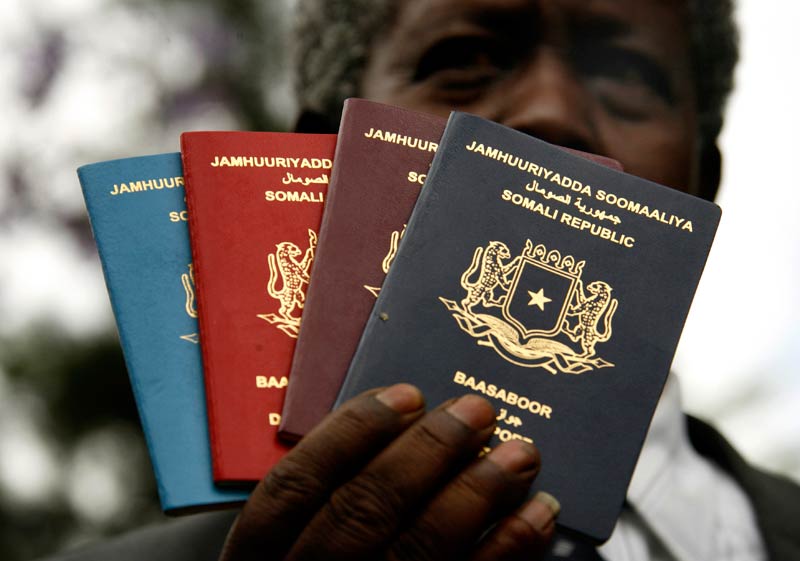
Some of my oldest memories as a child are of sunny weekend mornings eating canjeero, staring wide-eyed at my parents as they yelled into the receiver. That’s how you knew they were talking to relatives back home. The amplitudes of their voices would let us know right away they were on a long distance call. My brothers and I would always laugh at the faces they made when the connection was particularly bad. They winced and yelled and repeated the same sentences over and over and we, being nothing but the goofy children we were, found their facial expressions, their repetitions hilarious.
They would ask so-and-so if they had received their money, would inform their siblings or cousins how much would go to whom. Some was intended for so-and-so’s schooling, this part would go to grandmother, and this fraction to another aunt or uncle. Education was paid for, healthcare, rent, you name it. I still watch them go through the same routine.
I remember walking to Western Union with my father as a child; the Ghanaian clerk still works there. It is not a Western Union anymore, the banners changed more than once the past few years but if one thing stays the same, it was going to that office and getting that money transferred. The companies changed but the people stay; bills still need to get paid.
I remember telling my father he had to introduce me to the relatives I had yet to meet, by phone now and in person eventually. I remember looking up at him and saying, in that serious manner children adopt when they believe what they are saying is of utmost importance: “If you die, I will have to send them that money, but how would I know who to send it to?”
I hardly remember his exact words, but I recall his loud laugh, his hand on my head and him telling me that there are no ‘ifs’ but ‘whens’; that I would meet everyone eventually; and that I needed to worry about that French homework in front of me, not the bills of my incalculable number of relatives.
Every now and then there’s a new name. some are feeling the effects of the drought; a relative living in an affected area is calling right this moment.
It is a 20 minute drive to the place. For years now my parents have been dealing with the same Somali woman and the money transfer company she works for. Money exchanges hands, a text message is sent, a phone call is made. A day or two later a call to relatives; a confirmation.
This reality is not ours alone. I am 20 now and realising how, for the past two decades, Somalia has heavily relied on remittances in order to sustain herself. That with conflict and political instability, money transfers from the diaspora directly to the intended recipients has become more reliable than incomes garnered from economic institutions on ground; and remittance money has not only become the main source of individual/household sustenance, but also contributes to investment.
A post on the World Bank blog asked if Somalia could survive without its remittance. For most people, when they think of the country, the images that come to mind are of pirates or face-covered al-Shabab fighters brandishing automatic weapons and a black flag, or of malnourished victims of drought and poverty.
That however, is not a full picture. Other than livestock, Somalia’s (albeit largely informal) economy is based on remittances and telecommunications. Until very recently Somalia lacked a central bank and even now it isn’t as strong an institution as it should be. What kept the country together after the outbreak of the civil war, in terms of effective monetary management, are those many remittance transferring companies, which have been and still are the main financial industry relied upon.
The country is slowly rebuilding. infrastructures are popping up; in some areas expats are moving back; the government has regained control of regions which had been for a long time under the grip of extremist fighters. And this doesn’t mean that remittance money has been dwindling; rather it has been and still is financing the latest developments the private sector has been undertaking.
According to Ifad (the UN’s International Funds for Agricultural Development), remittances flowing into the African continent reach close to $40 US billion. When it comes to the Somali diaspora, about $1.6-billion is sent yearly to the country, and contributes to various vital fields, from education to healthcare to basic necessities such as food and shelter.
However, it all isn’t picture perfect. Recently, as more light was shed on the exorbitant fees imposed on remittance money sent to Africa, “leading money transfer companies” have come under scrutiny. Many are realising, and talking about, the fact that “the African Diaspora is being charged twice the global average” to send money home. The Somali central bank is now in its fifth year of existence after its destruction and optimists might say that once it gets on its feet, it could in the future set policies and regulations which would eventually lead to the establishment of reliable banks.
Sumaya Ugas is an undergraduate student at McGill University. She studies International Development and Political Sciences. A lover of words, she is constantly carrying a novel (or three) and writing. This post was first published on Rise Africa, a blog written by a group of individuals who seek to create an atmosphere that encourages conversation between Africans on the continent and in the diaspora. Connect with them on Twitter: @riseafrica








